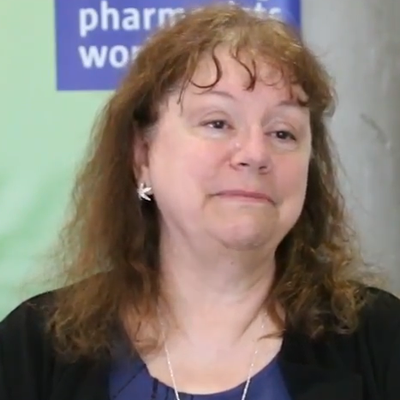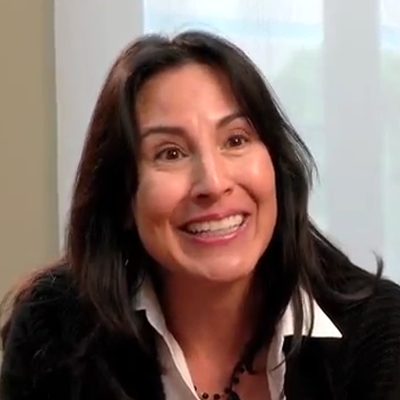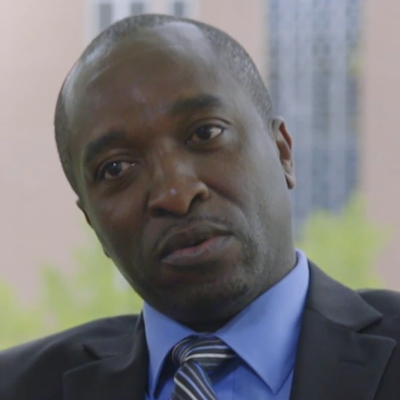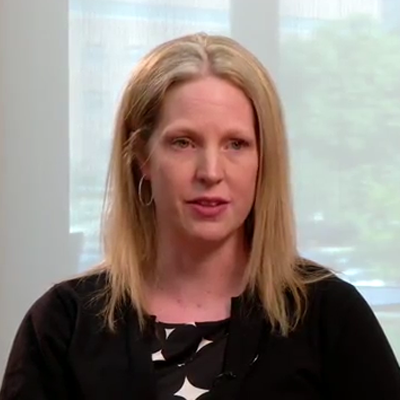North American-Trained PharmD Program
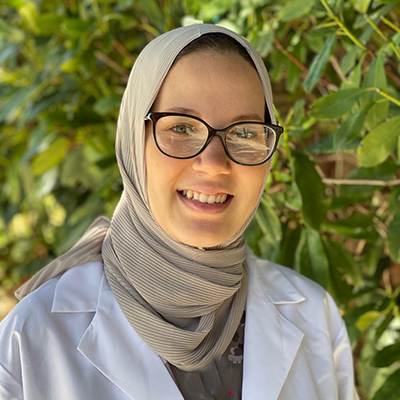
Omniah Elmorshedy, PharmD, NTPD Graduate
“One thing this program taught me was how to approach different patient scenarios, how to check and follow guidelines and provide evidence-based recommendations, and how to communicate with my patients. It taught me how to be a better provider.”
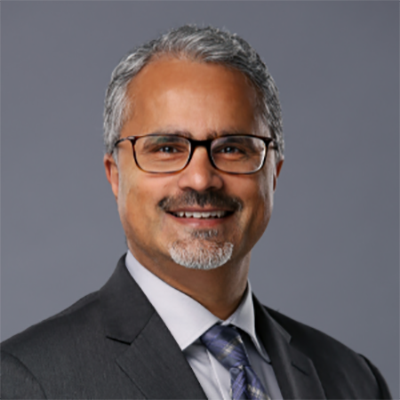
Lokendra Upadhyay, PharmD, NTPD Graduate
“I’d been out in the working world for several years and then I thought to myself, ‘I need to get a PharmD because I need to be relevant and I’m a working person, I have a family, so I needed something flexible.'”
The NTPD Program requires the completion of at least 57 semester credit hours of didactic coursework* and 36 credit hours of experiential training in advanced pharmacy practice experiences (APPEs), or rotations, for a total of 93 semester credit hours.
Learn more about the didactic curriculum and experiential training in the Didactic and Experiential Curriculum tabs.
A program overview and timeline can be found here.
All students have six years to complete the program requirements. To offer maximum flexibility, the program’s courses may be completed in a part-time or full-time format. The NTPD Program encourages students to complete, at a minimum, four to six credit hours per semester for a part-time format.
Upon admission into the NTPD Program, all students will schedule an advising call. During the advising call, every student will receive an individualized plan defining how and when the student will complete the didactic and experiential requirements. Any student can request an advising call at any time during the semester.
*NOTE:
- If you are a student admitted prior to spring 2024, please work with your advisor for your individual academic plan.
This didactic curriculum builds on students’ baccalaureate degrees, focusing on a combination of professional skills courses (e.g. Patient-centered communication, Clinical Pharmacokinetics, Pharmacogenomics, Evidence-based Medicine & Literature Evaluation, Interprofessional Education courses, Public Health & Health Outcomes, Clinical Capstone, and others) and pharmacotherapy courses, which are the core of the didactic curriculum.
Pharmacotherapy courses address the pathophysiology, advanced pharmacotherapeutics, pharmacokinetics and professional skills development specific to the disease state. For example, the cardiovascular course includes:
- The pathophysiology of common cardiovascular disorders, such as hypertension, myocardial infarction, congestive heart failure and dysrhythmias;
- Pharmacotherapeutic management of patients with these disorders, including design of patient-specific individualized drug therapy treatment plans;
- Pharmacokinetics of drugs used to treat cardiovascular disorders;
- Basic cardiovascular physical assessment skills, such as blood pressure monitoring;
- Problem-based case discussions of patients with cardiovascular disorders;
- Other appropriate clinical skills development activities.
Beginning Spring 2024, the NTPD Program experiential training curriculum includes 36 weeks or 1440 hours of advanced pharmacy practice experiences (APPEs) in the following practice areas:
- Community Pharmacy – Required / ACPE Core
- Ambulatory Care – Required/ ACPE Core
- Health System Acute Care / General Medicine – Required/ ACPE Core
- Health System Institutional – Required / ACPE Core
- Elective One
- Elective Two
The required APPE rotation practice areas are community pharmacy, ambulatory care, health system acute care / general medicine, and health system institutional In addition, there are two elective APPE rotations. Elective APPEs may be selected from a variety of medicine subspecialties, such as neurology, oncology, nutrition, infectious disease, critical care, psychiatry and pediatrics. Students can choose from other elective rotation choices including: pharmaceutical care projects, community pharmacy, education, administration, industry, managed care and clinical research.Students have increased flexibility in how they complete the APPE rotations. The APPE rotations can be accomplished by performing live rotations on a full-time basis and in cooperation with the rotation preceptor.
In addition, the APPEs may also be completed through a combination of live rotations and challenging some APPEs for academic credit through a credit-by-challenge submission, within the APPE guidelines of the program.
More information about the APPE rotations and credit-by-challenges is located on the Experiential website page with the Current Student section for Online Students.
The North American-Trained PharmD (NTPD) Program is open to pharmacists who are licensed in the United States or Canada and are in good standing with the licensing agency, provided the following requirements are met:
- The applicant received a baccalaureate degree from a five-year pharmacy program accredited by ACPE or Canadian Council for Accreditation of Pharmacy Programs (CCAPP) and holds a valid license to practice pharmacy in the United States or Canada; or
- The applicant received a pharmacy degree from a non-United States or non-Canadian program and holds a valid license to practice pharmacy in a United States jurisdiction, having passed the FPGEE/FPGEC from the NABP, assuring education equivalency to an ACPE-accredited program.
- Please Note: The Distance Degrees and Programs (DDP) Office offers two ACPE accredited PharmD programs: the NTPD Program and the International-Trained PharmD (ITPD) Program. All licensed pharmacists who are not licensed to practice pharmacy in the United States, or are licensed to practice in Canada but were educated outside of Canada (ie, a non-CCAPP-accredited school) or whose program was not CCAPP-accredited are encouraged to review the admissions requirements for the ITPD Program.
University policies require background checks for all students upon admission. The Admissions Committee reserves the right to consider exceptions to admissions policies on a case-by-case basis.
Students may begin the NTPD Program in the fall semester. Applications are accepted at any time for the NTPD Program, provided the applications are received prior to each semester's deadline. Application deadline is July 15. We will not be accepting new applications after this application cycle.
If the deadline falls on a weekend or United States holiday, then the deadline will be the next business day. Please contact the DDP Office if there are concerns about meeting the application deadline. Otherwise, applications received after the semester's deadline will be considered for the next admissions cycle. Students may request to defer their admission up to 1 year after their initial admission term. Students who fail to enroll in any course within that year may be required to reapply. Admission extensions to the NTPD program will be determined on a case-by-case basis.
As a student of the University of Colorado Skaggs School of Pharmacy and Pharmaceutical Sciences, all NTPD students are subject to all school and program policies as our entry-level PharmD students, including the ethics and conduct code and academic advancement policies. A full list of these policies is located on the Policies and Procedures webpage.
To apply to the NTPD Program, applicants must complete ALL of the application materials listed below. All application materials are reviewed by the School of Pharmacy Admissions Committee.
PLEASE NOTE: Successful completion of the NTPD program’s pathway to the PharmD degree does not ensure eligibility for licensure in the US, as each state sets its own requirements for licensure.
Application Materials
Tuition and Fees
New tuition rates are established each spring and normally go into effect fall semester. An outline of the current tuition and fees (US dollars) is located below in the tuition tab.
Once students have registered for classes, a bill for tuition and fees will be generated through the Bursar’s Office; students will not receive a paper bill. All tuition and fees are due within 30 days of the first day of class.
Students will not be able to register for subsequent semesters unless the bill from previous semesters has been paid in full. Once the payment is received and processed, an official statement of payment will be available online for use with taxes or for employee reimbursement programs.
Refunds - Students who drop a class within the guidelines specified below will receive an adjusted tuition bill. The drop/add date is located on the DDP academic calendar. Any refunds due will be processed automatically by the Bursar's Office.
| Drop Date | Remaining Course Load | Tuition Due | Tuition Refund |
| Before Drop Date | Zero or any course load | 0% | 100% |
| After Drop Date | Zero or any course load | 100% | 0% |
705 KB
Scholarships and Financial Aid
Scholarships sometime become available for students. An email will be sent to each student's UCDenver email account to inform students of any scholarship opportunities. In addition, scholarship information may be included in the News section of the School of Pharmacy website.
Financial aid information is available from the Anschutz Medical Campus Financial Aid & Scholarships Office.
